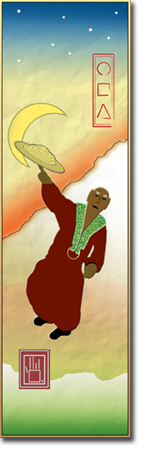On The Way: The Daily Zen Journal
The Sermon of No Words
Takashina Rōsen (1876-1968)

There is an ancient saying: “Better an inch of practice than a foot of preaching.” It refers to the sermon preached by the body itself, through action and without speaking.
The sermon of words and phrases is the finger pointing to the moon, the fist knocking at the door. The object is to see the moon not the finger, to get the door open and not the knocking itself; so far as these things do achieve their objects they are fine.
The object of the Buddha’s life of preaching was not to turn words and phrases. The Diamond Sutra compares his sermons to a raft, which is only an instrument for reaching the far shore. The sermon which is an instrument can be discarded after a time, but the real preaching—which is not discarded—is the preaching by the body itself.
As to what that preaching may be, the truth of it is very profound, but in simple language it means that others receive right inspiration from that person. It is said that when a Bodhisattva has continued his or her spiritual practice for three kalpa-ages s/he is qualified to be a Buddha. After a hundred ages, their appearance becomes majestic.
This does not mean anything outwardly magnificent, but it means that in helping others the manner in which the things are done is of first importance, and through the force of wisdom and compassion there manifests in them a peculiar dignity and tenderness.
By contemplating the form of Bodhisattvas like Kannon and Jizo, one’s heart becomes somehow softened, but along with that there is something awe-inspiring which cannot be easily expressed. When a person feels it within all the time, it is naturally reflected in his or her outward appearance, and love and respect are attracted to them from others.

What gives us inspiration is the sermon of action of the Bodhisattvas. They have the power to do it without uttering a word. But it is not to be confined to Buddhas and Bodhisattvas. For religious and other teachers, for all who stand in authority whether over many, as head of a household with many dependents, or as employer of a single man or woman, it is all-important.
A sermon is not something said by the Buddha long ago, or prated nowadays from a pulpit. The sermon of words is like a sort of advertising puff; but the real sermon is when the employer acts as a right employer, the worker as a right worker, and so on with the merchant and official.
All things, dogs and cats, trees and grass, things animate and inanimate, have also to express their right path, and, so far as they keep to it without faltering, it is the sermon of action.

A poem of Sontoku expresses it:
“Without voice or incense, heaven and earth are ever repeating the unwritten scripture.”
The man called Reiun was realised when he saw the peach blossoms; Kyogen when he heard a stone strike against bamboo. There are instances of people who having matured their spiritual training were then enlightened on seeing the flying petals and falling leaves of autumn.
The Buddha himself had great realization on seeing the brilliance of the morning star. In the same way the mountains and rivers and sun and moon and stars, every morning and night, are preaching the sermon to bring us to realization.
We should understand that it is never effective merely to rebuke others harshly. Let each of us keep to our own role and play it properly; then a beauty will manifest spontaneously; high and low will be affected, and their conduct will change to harmony and virtue.
Since the self is a creation of the mind and good and bad too are from the mind or, rather, correspond to the spiritual beauty or ugliness of the person, the first thing is to train the mind. Training produces a charm and power which appears externally and affects others. There are various ways and means in spiritual training, but the first thing is faith.

One’s faith may be true or false, right or mistaken, shallow or deep, high or low and so on. When this reverent faith bubbles up in us, our everyday limited nature of itself begins to shine with the light of compassion, and the beauty and power of the true heart break forth, and we move in harmony with the Buddha-light.
When this happens the virtues of the Buddha-body are ever in our breast, and from head to foot our action is prompted by the Buddha. Such is the life of faith, and in it every incident preaches the sermon of action.
Those who have no light in their hearts are always in darkness, a darkness in which a hundred demons come and go. Under their sway, life goes from darkness to darkness, ordinances of heaven are broken, and there is much suffering.
Faith is all important to people, and it is given to us by religion. There are different religions also, but in Japan Buddhism has come down in an unbroken stream for well over a thousand years and has deeply penetrated the life of the people. If we live with faith in the Way and in the Bodhisattva spirit preach the sermon of action, we demonstrate the sermon of no words to the people of the world, and this is the supreme task today.
Takashina Rōsen (1876-1968)
Excerpted from The Tiger’s Cave Trans Trevor Leggett 1964 out of print – can now be found in A Second Zen Reader trans Trevor Leggett 2018





Whether we call what we do Zen practice or Buddhism or Humanism or any other ism, the higher vision of what we can be here is to walk our talk. This action-from-stillness way of life is what we live each day in our actions. To live with a code or life of practice means that through our actions alone anyone can see the result of practicing the Way.
We can take any paramita and immerse ourselves in living according to that, for example, dana or generosity. No need to make a big show of sharing or giving what you can to help those less fortunate, it is just a part of what we do quietly. And in the actions of giving and compassion, others witness through those actions a higher way to be here, and sometimes this can be contagious in a healthy way.
To live according to sila or morality suggests the many ways to live that express a life of practice. To live an honest and forthright life through action, people witness someone whose word carries the weight of sincerity. To be responsive in a timely fashion demonstrates respect for another’s time. There are endless ways to express a life of practice. It starts with reflection and finding a way to begin. At heart we are in this together; it is not a practice just for our own evolution, but it is for the good of all.
The Boddhisattva ideal is to delay any final enlightenment until all beings have become enlightened…
“Sentient beings are numberless,
I vow to save them;
Deluding passions are endless,
I vow to destroy them
Dharma gates are manifold,
I vow to enter them;
The Buddha Way is supreme,
I vow to master it.”
Aspiring to actions from stillness,
Elana, Scribe for Daily Zen